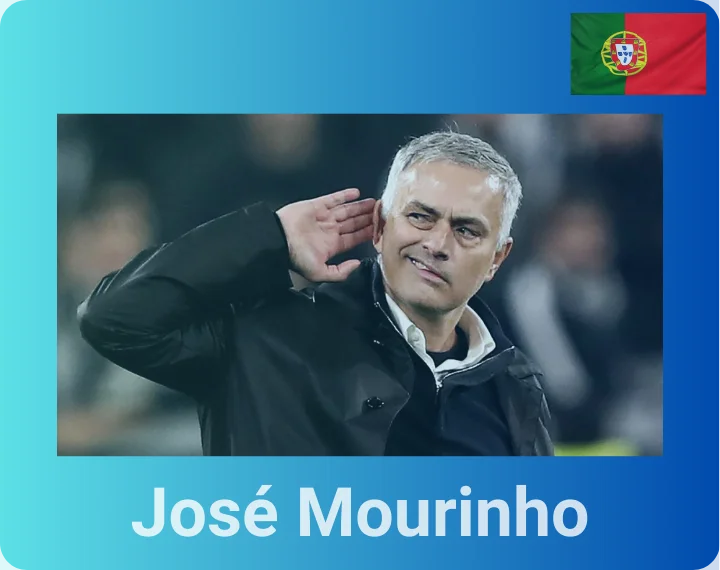José Mourinho: Philosophy, Tactical Strategy & Managerial Identity
The tactical style of José Mourinho, one of the most significant football managers of the contemporary period, is based on pragmatism, defensive stability, and an unshakable will to win. A special combination of mental toughness, strategic discipline, and adaptability define his managerial identity. Mourinho’s reputation as a tactical genius has been solidified by his ability to assemble winning sides despite the competition and the situation. Beyond his wins, he has influenced how contemporary football coaches handle crucial games, defensive schemes, and match administration.
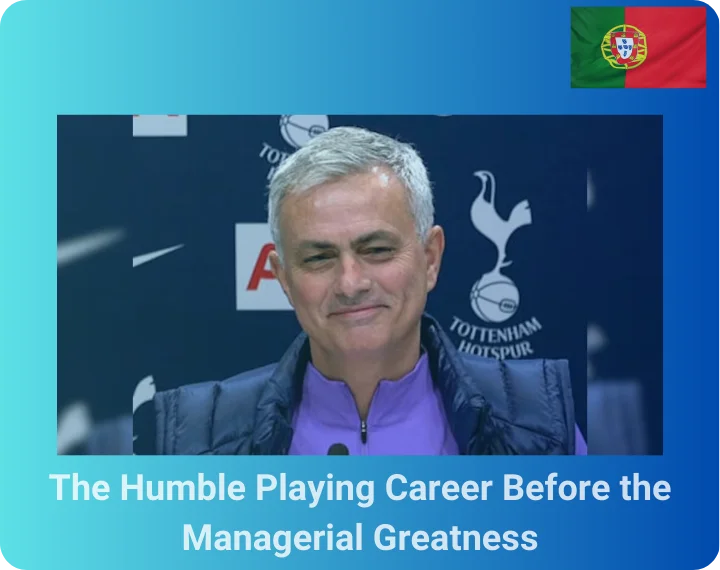
Core Footballing Philosophy
The cornerstone of José Mourinho’s football philosophy is the idea that results should come first. His strategy for winning at all costs is primarily practical. Mourinho prioritizes strategic organization and mental discipline over possession-based or aesthetically beautiful play, in contrast to many of his peers. His strategies are constantly flexible, taking into account the advantages and disadvantages of his opponents and teams, but the end objective is always the same: victory.
Mourinho emphasizes the importance of defensive solidity. His teams are known for their compact defensive structures, where players are drilled to stay disciplined and maintain their shape, especially during key moments of the game. This discipline allows his sides to frustrate opposition attacks, leaving them with limited opportunities to break down his defense.
Another hallmark of his philosophy is mental toughness. Mourinho demands a high level of resilience from his players, particularly in high-pressure situations. He encourages a siege mentality, where his teams operate as a unit, with a collective focus on overcoming adversity and handling the psychological demands of top-level football.
Finally, Mourinho has unmatched game management skills. He naturally understands how to control the tempo of a game, whether that means making crucial substitutions, slowing down to preserve a lead, or regulating the pace of the contest. His ability to adjust to shifting conditions and his tactical skill guarantee that his teams stay competitive no matter what.
Key Aspects of Mourinho’s Core Philosophy:
| Key Principles | Description |
| Results-Driven Approach | Focus on securing victories regardless of style or flair. |
| Defensive Discipline | Emphasis on a solid, organized defensive structure. |
| Mental Toughness and Resilience | Instilling a strong mentality to cope with adversity. |
Results Above All – The Pragmatic Approach
The foundation of José Mourinho’s managing philosophy is pragmatism. Regardless of the style of play, his primary concentration is on getting results. Even if it means playing a more conservative, defensive style of football, Mourinho has never been one to pursue artistic football in favor of a tactical system that guarantees win. His motto is straightforward: entertain second, win first. His teams have continuously proved difficult to break down, even if it meant forgoing offensive flair in favor of defensive consistency, demonstrating this mentality throughout his career.
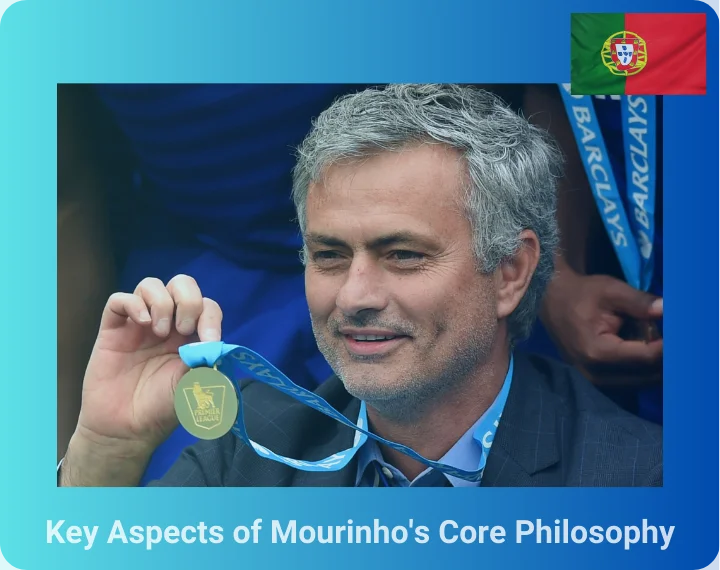
Winning Mentality and Defensive Discipline
A winning mindset is key to Mourinho’s philosophy. The idea that no obstacle is insurmountable is ingrained in his troops. His teams frequently use two banks of four to compress space and limit the opponent’s opportunities because of this mentality and strict defensive discipline. He has among of the strongest defensive structures in contemporary football, which frequently frustrates opponents and prevents them from breaking through.
Mastering the Art of Game Management
Because of his capacity to oversee games, Mourinho is now well known for giving his teams total control over the outcome of matches. Managing possession, making tactical substitutions, or stopping the opposition’s attack are all ways that Mourinho is an expert at regulating the game’s tempo. Throughout his career, he has stood out for his ability to manage game tempo and make tactical adjustments on the fly.
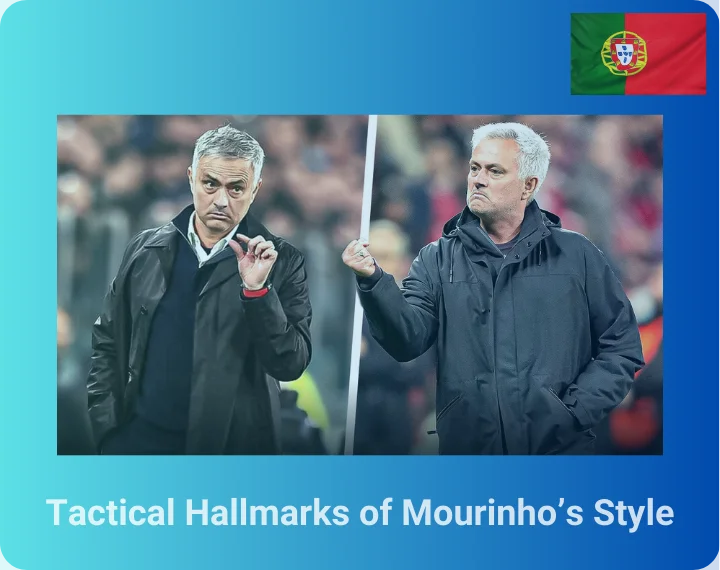
Tactical Hallmarks of Mourinho’s Style
Compact Defensive Block and Low Press
Mourinho is well known for his small defensive block, which takes up very little room and makes it very hard for opponents to get through. His teams frequently use a low press to induce errors and recapture possession in beneficial spots while sitting deep, particularly during high-pressure games. With Mourinho’s teams skillfully blocking off passing channels and pushing their opponents to play wide, this arrangement makes it difficult for teams to get central.
Fast Transitions and Counter-Attacking Brilliance
When his squad regains control, Mourinho’s counterattacking strategy comes into play. His sides are taught to move the ball fast and take advantage of whatever gaps the opposition leaves. His tactical strategy heavily relies on quick transitions, with players moving quickly and accurately from defensive formations to offensive positions. Many of Mourinho’s greatest triumphs have been largely attributed to his ability to plan swift counterattacks.
Use of a Holding Midfielder and Solid Backline
Holding midfielders, who serve as a barrier for the backline, disrupt rival assaults, and help the side stay organized, are highly valued by Mourinho. Reusing possession and committing tactical fouls when called upon are frequent duties for this defensive midfielder. This configuration, along with a strong defense, guarantees that Mourinho’s teams are difficult to defeat, even when facing the most formidable offensive teams.
Game Preparation and Psychological Edge
Tactical Preparation Based on Opponent Analysis
Mourinho is meticulous when it comes to game preparation. He invests significant time analyzing his opponents, studying their strengths and weaknesses, and crafting a tactical plan designed to exploit the opposition’s vulnerabilities. His attention to detail ensures his teams are always prepared, no matter the challenge ahead.
Mental Warfare and Press Conference Strategy
Mourinho’s ability to use mental warfare is one of the more contentious elements of his strategy. Whether it’s his famous press conferences or remarks meant to divert rival managers and players, Mourinho frequently employs mind games to obtain an advantage. Another strategy in his repertoire is to control the conversation about a game, his team, and the competition.
Building a Siege Mentality Within the Squad
Additionally, Mourinho is renowned for instilling a siege mentality in his squads. This mindset aims to create a unified squad in the face of hardship by encouraging a collective “us against the world” mentality. He is a strong and capable leader who can inspire players with both harsh criticism and encouraging words.
Evolution Over the Years
From Porto’s Tactical Flexibility to Inter’s Defensive Masterclass
At Porto, where he demonstrated that he could adjust his system to his team’s capabilities, Mourinho’s tactical flexibility defined his early career. In order to establish the defensive competence that would eventually characterize his style, he took a more defensive stance at Inter Milan. Inter’s Champions League victory in 2009–2010 was the best example of his ability to put together a side that was both tough and dangerous.
More Attacking Phases at Real Madrid and Chelsea (2nd Spell)
By combining defensive consistency with more dynamic offensive play, Mourinho modified his strategy during his tenure at Real Madrid to fit the attacking talent at his disposal, notably Cristiano Ronaldo. He continued to develop at Chelsea (during his second stint), retaining his defensive roots while assembling a more attacking lineup with players like Eden Hazard and Diego Costa.
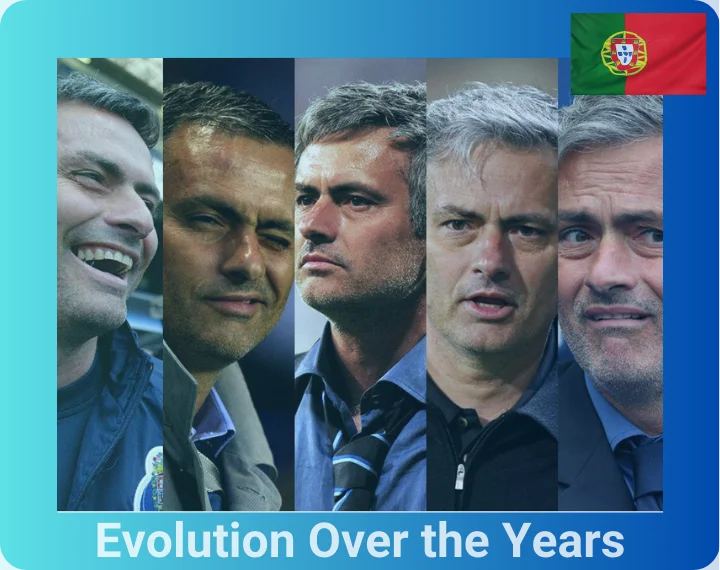
Recent Adjustments at Roma – Blending Experience with Youth
At AS Roma, Mourinho has been tasked with blending experience with youth, creating a team that plays more freely than his previous sides. His time in Italy has seen him embrace a slightly more flexible attacking style, though the trademark defensive organization remains at the core of his tactics.
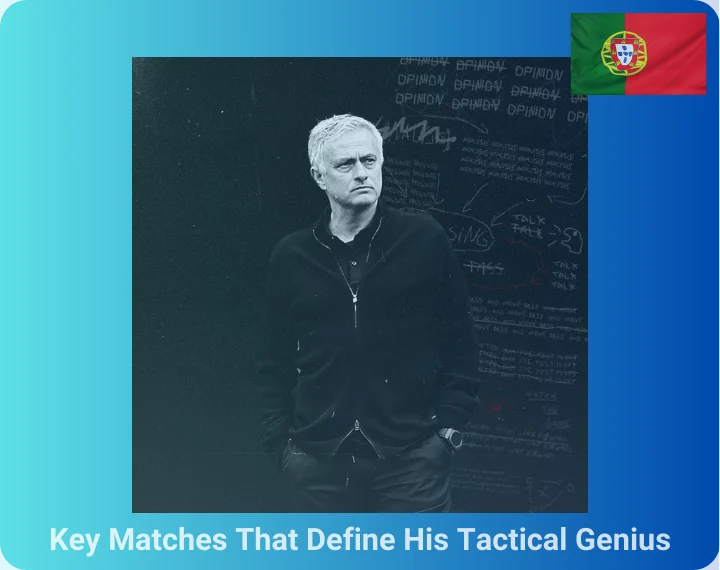
Key Matches That Define His Tactical Genius
2010 Champions League Semifinal vs Barcelona (Inter Milan)
The 2010 Champions League quarterfinal matchup with Barcelona is among the most well-known examples of Mourinho’s tactical prowess. Barcelona’s unchecked offensive plan was stopped by Inter Milan’s perfect demonstration of tactical discipline. Inter reached the Champions League final and took home the trophy thanks to Mourinho’s defensive tactics and potent counterattacks.
Chelsea’s Win Over Arsenal with 10 Men (2005)
Despite being reduced to 10 men, Mourinho once again showed off his tactical prowess as Chelsea overcame Arsenal in 2005. Despite being outnumbered, Chelsea launched a successful counterattack by using a compact defensive approach and exploiting Arsenal’s space. They possessed extraordinary tactical skill and perseverance. Mourinho won this game by demonstrating his capacity to overcome hurdles.
Tactical Battle vs Manchester City in 2021 Europa League Qualification (with Spurs)
When Spurs qualified for the Europa League in 2021, Mourinho had to contend with a tactical matchup with Manchester City. Even though Spurs didn’t make it in the end, Mourinho’s strategy, which included neutralizing City’s attacking threats, demonstrated how well he prepared for top clubs.
Mourinho’s Impact on Modern Coaching
Influence on the Rise of Reactive Football in Big Games
It is impossible to overestimate Mourinho’s influence on contemporary football. Because of his success, reactive football has become more popular, with managers positioning their teams to counterattack and absorb pressure, particularly in games with high stakes. A generation of managers have adopted similar defensive frameworks and tactical flexibility as a result of his success.
Inspiring a Generation of Tactical Realists
Through his achievements, Mourinho has inspired many tactical realists who understand that sometimes playing beautiful football takes a back seat to securing three points. His pragmatic approach, emphasizing defensive discipline and efficient game management, has shaped the thinking of coaches across the world.
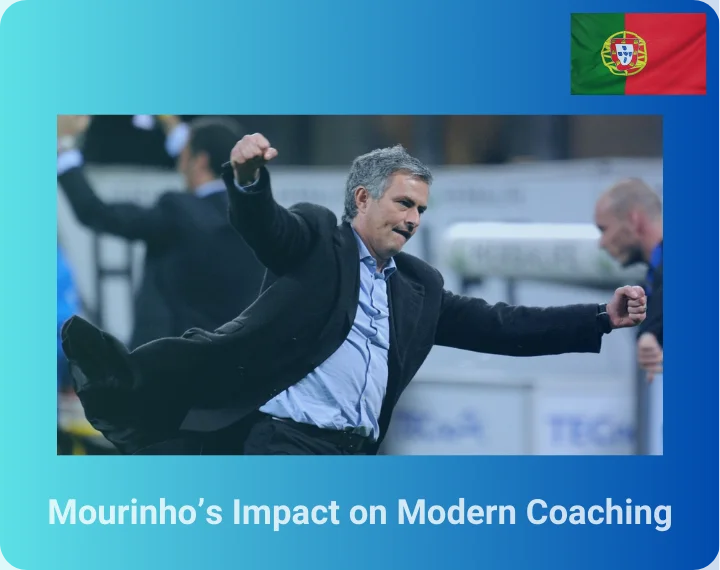
Legacy of Prioritizing Mental Toughness and Match Control
Perhaps Mourinho’s greatest legacy is his emphasis on mental toughness and the importance of match management. His technical prowess and ability to inspire players to perform well under pressure make him one of the most significant managers in football history. His influence will endure for many decades as long as instructors continue to apply his lessons.
Summary of Key Points
| Core Philosophy | Tactical Style | Managerial Evolution |
| Results above all, pragmatism | Compact defense, counter-attacks | Evolving with experience |
| Winning mentality, defensive focus | Fast transitions, holding midfielder | Blending youth and experience |
| Mastery of game management | Low press, solid backline | From Porto to Roma |
